
Thelypteridaceae is a family of about 900 species of ferns in the order Polypodiales. In the Pteridophyte Phylogeny Group classification of 2016, it is placed in the suborder Aspleniineae. Alternatively, the family may be submerged in a very broadly defined family Aspleniaceae as the subfamily Thelypteridoideae.
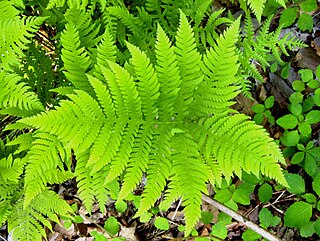
Phegopteris is a genus of ferns in the family Thelypteridaceae, subfamily Phegopteridoideae, in the Pteridophyte Phylogeny Group classification of 2016. They are known collectively as the beech ferns. Species are native to Asia, North America and Europe.

Cyrtomium is a genus of about 35 species of ferns in the family Dryopteridaceae, subfamily Dryopteridoideae, according to the Pteridophyte Phylogeny Group classification of 2016. Species are native to Asia, Africa, and the Pacific Ocean islands (Hawaii). It is very closely related to the genus Polystichum, with 2016 research suggesting it should be included in a clade sister to Polystichum s.s.

Microsorum is a genus of ferns in the family Polypodiaceae, subfamily Microsoroideae, according to the Pteridophyte Phylogeny Group classification of 2016 (PPG I). The species are tropical. Like most ferns, they grow from rhizomes, rather than roots. The genus name is often misspelled "Microsorium" or "Microsoreum". It includes some species that are lithophytic rheophytes.
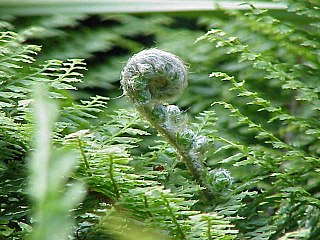
Polystichum is a genus of ferns in the family Dryopteridaceae, subfamily Dryopteridoideae, according to the Pteridophyte Phylogeny Group classification of 2016. The genus has about 500 species and has a cosmopolitan distribution. The highest diversity is in eastern Asia, with about 208 species in China alone; the region from Mexico to Brazil has at least 100 additional species; Africa, North America, and Europe have much lower diversity. Polystichum species are terrestrial or rock-dwelling ferns of warm-temperate and montane-tropical regions. They are often found in disturbed habitats such as road cuts, talus slopes, and stream banks.
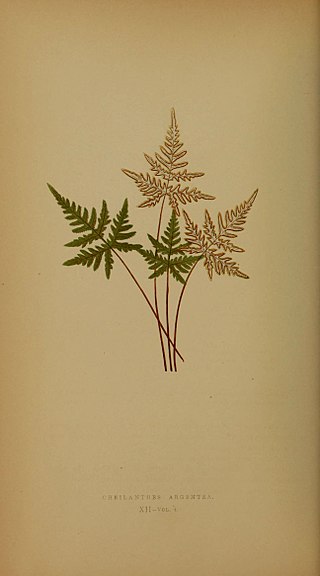
Aleuritopteris is a genus of ferns in the Cheilanthoideae subfamily of the Pteridaceae. As with some other genera of the Cheilanthoideae, molecular phylogenetic studies have suggested that it is not monophyletic, and so may need to be circumscribed differently in future.

Arachniodes is a fern genus in the family Dryopteridaceae, subfamily Dryopteridoideae, in the Pteridophyte Phylogeny Group classification of 2016. A number of species in this genus are known as "holly ferns".

Neocheiropteris is a genus of ferns in the family Polypodiaceae, subfamily Microsoroideae, according to the Pteridophyte Phylogeny Group classification of 2016 (PPG I).
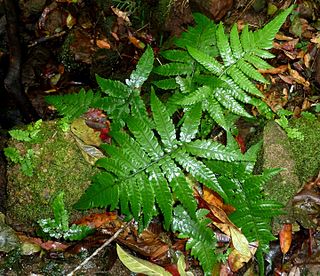
Deparia is a genus of ferns. The Pteridophyte Phylogeny Group classification of 2016 places the genus in the family Athyriaceae, although other sources include it within an expanded Aspleniaceae or Woodsiaceae.

Microsoroideae is a subfamily in the fern family Polypodiaceae in the Pteridophyte Phylogeny Group classification of 2016 (PPG I). The subfamily is also treated as the tribe Microsoreae within a very broadly defined family Polypodiaceae sensu lato. In either treatment, it includes the previously separated tribe Lepisoreae.

Christella is a genus of around 70-80 species of ferns in the subfamily Thelypteridoideae of the family Thelypteridaceae in the Pteridophyte Phylogeny Group classification of 2016. Other sources sink Christella into a very broadly defined genus Thelypteris. The genus was named after Konrad H. Christ, a Swiss botanist. The distribution of these plants is mostly in the tropics and sub tropical areas. An Australian example is C. dentata.

Cyclosorus is a genus of ferns in the family Thelypteridaceae, subfamily Thelypteridoideae, in the Pteridophyte Phylogeny Group classification of 2016. Other sources sink Cyclosorus into a very broadly defined genus Thelypteris, or expand the genus to include other genera which PPG I keeps separate. Thus the online Flora of China suggests there are about 250 species compared to the two species suggested in PPG I.
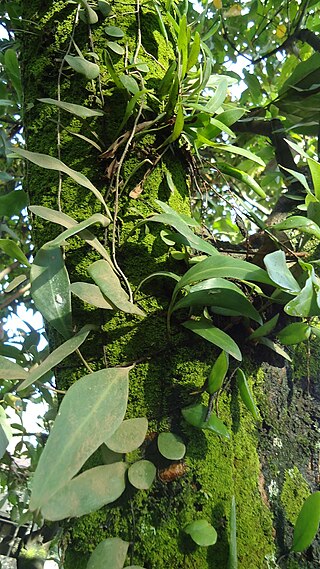
Pyrrosia is a genus of about 100 fern species in the polypod family, Polypodiaceae. Like other species in Polypodiaceae, the species of Pyrrosia are generally epiphytic on trees or rocks, a few species are terrestrial. The Latin name of Pyrrosia comes from the Greek pyrrhos (red), which refers to its leaves that are red due to the sporangia.

Paragymnopteris is a genus of ferns in the subfamily Cheilanthoideae of the family Pteridaceae. Species of Paragymnopteris are native to the Old World.
Oeosporangium is a genus of ferns in the subfamily Cheilanthoideae of the family Pteridaceae. The genus has not always been recognized. In the Pteridophyte Phylogeny Group classification of 2016 it was included in Allosorus. It was accepted by the Checklist of the Ferns and Lycophytes of the World as of January 2020. As circumscribed there, the genus is native to the Old World.

Macrothelypteris is a genus of ferns in the family Thelypteridaceae, subfamily Phegopteridoideae, in the Pteridophyte Phylogeny Group classification of 2016. The genus name means 'large Thelypteris'.
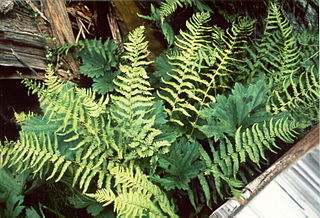
Parathelypteris is a genus of ferns in the family Thelypteridaceae, subfamily Thelypteridoideae, in the Pteridophyte Phylogeny Group classification of 2016. Other sources sink Parathelypteris into a very broadly defined genus Thelypteris.
Stegnogramma is a genus of ferns in the subfamily Thelypteridoideae of the family Thelypteridaceae in the Pteridophyte Phylogeny Group classification of 2016. Other sources sink Stegnogramma into a very broadly defined genus Thelypteris.

Lemmaphyllum is a genus of ferns in the family Polypodiaceae, subfamily Microsoroideae, according to the Pteridophyte Phylogeny Group classification of 2016 (PPG I).

Lepisorus is a genus of ferns in the family Polypodiaceae, subfamily Microsoroideae, according to the Pteridophyte Phylogeny Group classification of 2016 (PPG I).

















